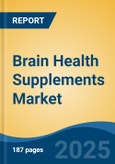Vitamins & Minerals is the fastest growing segment, North America is the largest market globally
Speak directly to the analyst to clarify any post sales queries you may have.
10% Free customizationThis report comes with 10% free customization, enabling you to add data that meets your specific business needs.
Key Market Drivers
The rising awareness of cognitive health and mental well-being significantly drives the global brain health supplements market. Heightened public discourse and readily available information regarding mental wellness are transforming how individuals perceive and proactively address cognitive function. Consumers are increasingly seeking solutions to enhance memory, focus, and mood, moving from reactive treatments to preventative strategies. This shift is particularly evident across various demographics and among professionals aiming for sustained cognitive performance.Key Market Challenges
A significant challenge impeding the growth of the Global Brain Health Supplements Market stems from the ongoing regulatory scrutiny and the lack of consistent scientific consensus concerning the efficacy of many product claims. This situation directly fosters widespread consumer skepticism. When scientific evidence supporting specific cognitive benefits remains inconsistent or unvalidated, consumers become hesitant to invest in these products, questioning their tangible value and safety.Key Market Trends
The global brain health supplements market is undergoing a significant transformation driven by evolving consumer preferences for ingredient sourcing. A prominent trend is the pronounced shift towards natural and plant-based formulations, reflecting broader consumer demand for clean-label products and sustainable options. This influences product development and ingredient selection, with botanical extracts gaining traction for their perceived cognitive benefits. According to the American Botanical Council's 2024 Herb Market Report, U. S. retail sales of herbal dietary supplements, which often feature ingredients for cognitive enhancement, reached a record $13.231 billion in 2024, representing a 5.4% increase from the previous year. This sustained growth underscores strong consumer interest in plant-derived solutions for health.Key Market Players Profiled:
- Natural Factors Nutritional Products Ltd
- Cardinal Health, Inc.
- Onnit Labs, Inc.
- Purelife Bioscience Co., Ltd
- Intelligent Labs
- Accelerated Intelligence Inc.
- NOW Foods
- Health Via Modern Nutrition Inc.
- Teva Pharmaceutical Industries Ltd.
- Peak Nootropics
- Alternascript
Report Scope:
In this report, the Global Brain Health Supplements Market has been segmented into the following categories:By Product:
- Natural Molecules
- Herbal Extract
- Vitamins & Minerals
By Application:
- Memory Enhancement
- Attention & Focus
- Depression & Mood
- Sleep & Recovery
- Anti-aging & Longevity
- Stress & Anxiety
By Region:
- North America
- Europe
- Asia Pacific
- South America
- Middle East & Africa
Competitive Landscape
Company Profiles: Detailed analysis of the major companies present in the Global Brain Health Supplements Market.Available Customizations:
With the given market data, the publisher offers customizations according to a company's specific needs. The following customization options are available for the report:- Detailed analysis and profiling of additional market players (up to five).
This product will be delivered within 1-3 business days.
Table of Contents
Companies Mentioned
- Natural Factors Nutritional Products Ltd
- Cardinal Health, Inc.
- Onnit Labs, Inc.
- Purelife Bioscience Co., Ltd
- Intelligent Labs
- Accelerated Intelligence Inc.
- NOW Foods
- Health Via Modern Nutrition Inc.
- Teva Pharmaceutical Industries Ltd.
- Peak Nootropics
- Alternascript
Table Information
| Report Attribute | Details |
|---|---|
| No. of Pages | 187 |
| Published | November 2025 |
| Forecast Period | 2024 - 2030 |
| Estimated Market Value ( USD | $ 9.1 Billion |
| Forecasted Market Value ( USD | $ 12.86 Billion |
| Compound Annual Growth Rate | 5.9% |
| Regions Covered | Global |
| No. of Companies Mentioned | 11 |









